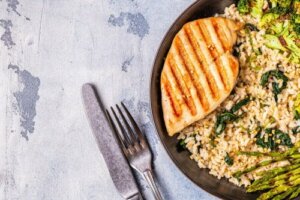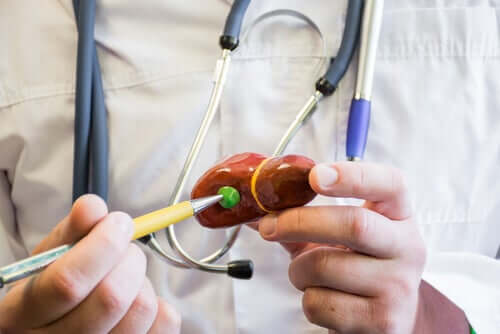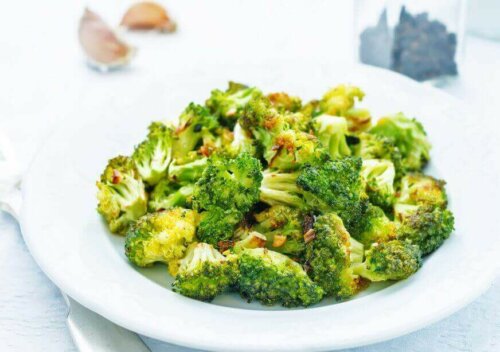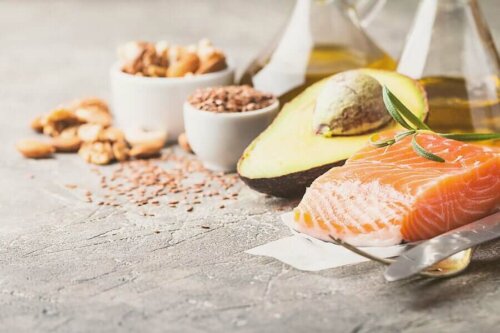The Best Diet After a Cholecystectomy or Gallbladder Removal


Reviewed and approved by the doctor Maricela Jiménez López
Was your gallbladder removed or will it be removed soon? When this happens, people commonly have doubts about what they should eat afterward. Your doctor will most likely give you a list of recommendations. However, you still may have some doubts.
Taking a look at this list of dietary recommendations that you should follow can certainly help you out with process. You’ll see that, although it’s a somewhat restrictive diet, it’s not impossible to follow.
We’re certain that by following these recommendations, your life will be fairly normal and you won’t experience any distress. What are you waiting for? Take note and don’t worry!
The gallbladder and the cholecystectomy

The first thing you should know is that the gallbladder is a small organ that, although it may not seem like it, is very important. ]One of its main functions is to store the bile produced by the liver to digest the fats you eat.
Experts from the Spanish Digestive System Foundation (Fundación Española del Aparato Digestivo) comment that “although its function is important, you can live without it“.
When the gallbladder doesn’t work properly (because the individual has gallstones or polyps), it’s likely that the doctor will consider resorting to a cholecystectomy, which is a common surgery.
Additionally. experts at the Mayo Clinic state that “the majority of people don’t have any digestive problems after a cholecystectomy. The gallbladder isn’t fundamental for healthy digestion“. However, it’s a good idea to bear some medical guidelines in mind when it comes to diet.
Foods permitted after the gallbladder removal
In order to help you make better choices about what you eat, below we share a list of permitted foods that you can eat after the gallbladder removal. This will allow you to create a more efficient dietary plan. This way, you won’t go hungry nor will you have any stomach problems.
Cooked vegetables
Eating vegetables is always really important. But when you don’t have a gallbladder, keeping your gut clean becomes even more important. Therefore, cooked vegetables are easier to digest and will help reduce the acidity caused by bile.
The problem with raw vegetables is that your stomach has a harder time digesting them. Although they provide the same amount of fiber, it’s best to avoid them so you don’t make your body work harder.
These are the vegetables we recommend:
- Cauliflower
- Broccoli
- Cabbage
- Carrots
- Peppers
- Green leafy vegetables

You may also be interested in: Tips and Recommendations to Freeze Broccoli
Foods that are high in soluble fiber
Eating soluble fiber reduces the negative effects of acid in the stomach, according to a study published in 2019. This nutrient helps eliminate bile more efficiently and quickly.
Some sources we recommend are:
- Bananas
- Lentils
- Beans
- Apples
- Carrots
- Blueberries
- Brussels sprouts
Lean proteins
Many people believe that after having the gallbladder removed you should avoid meats. However, that’s not entirely true. Of course, you should avoid meats that contain high levels of fat, whether they’re natural or fried.
But leaving that to one side, you should consume lean proteins fairly frequently. We recommend the following: turkey, lean cuts of beef, chicken, fish, and eggs.
In fact, specialists recommend you eat all of these. Consuming proteins helps maintain muscle mass and general body composition, according to an article published in Nutrition Reviews.
Healthy fats

Although your body won’t be able to digest fats as it used to after the gallbladder removal, you still need them. However, the fats you need are healthy and good quality. One example would be Omega 3 fatty acids:
- Olives
- Linseeds and chia seeds
- Fish (like sardines and salmon)
- Almonds and other nuts
Keep reading: How to Make a Creamy Avocado Sauce
Foods you should avoid after a gallbladder removal
Now that you know what you can eat after a gallbladder removal, it’s time to talk about what foods you should avoid at all costs. Although it may seem excessive, remember that following this diet will help avoid unnecessary discomfort.
- Fried foods. These are the first foods you should eliminate from your diet completely, especially if you don’t have a gallbladder. Fried foods contain hard-to-digest fats that affect your cardiovascular health.
- Excessively fatty foods. Although you should eat certain fats, it’s important to avoid high-fat foods. They may be natural but can occasionally cause heartburn and reflux. Some examples include bacon, fatty cheeses, fatty cuts of beef and pork, and chicken skin.
- Vegetable oils: although some vegetable oils provide omega-3 and 6, it’s best to avoid them because they’re harder to digest once cooked. It’s important to avoid foods that contain them, such as mayonnaise or dressings.
- Ready-made foods. Ready-made foods may seem like a simple solution to satiate your hunger. However, they also contain sugar, refined flour, and unhealthy fats that will make you feel bad quickly. Some examples are cookies, breads, instant soups, chips, etc.
Eat healthily and always look after yourself to avoid health problems. Your health will thank you and will repay you with overall wellbeing.
All cited sources were thoroughly reviewed by our team to ensure their quality, reliability, currency, and validity. The bibliography of this article was considered reliable and of academic or scientific accuracy.
- Yueh TP., Chen FY., Lin TE., Chuang MT., Diarrhea after laparoscopic cholecystectomy: associated factors and predictors. Asian Journal of Surgery, 2014. 37: 171-177.
- Altomare DF., Rotelli MT., Palasciano N., Diet after cholecystectomy. Curr Med Chem, 2019. 26 (19): 3662-3665.
- Kim JE., O’Connor LE., Sands LP., Slebodnik MB., et al., Effects of dietary protein intake on body composition changes after weight loss in older adults: a systematic review and meta analysis. Nutr Rev, 2016. 74 (3): 210-24.
This text is provided for informational purposes only and does not replace consultation with a professional. If in doubt, consult your specialist.








